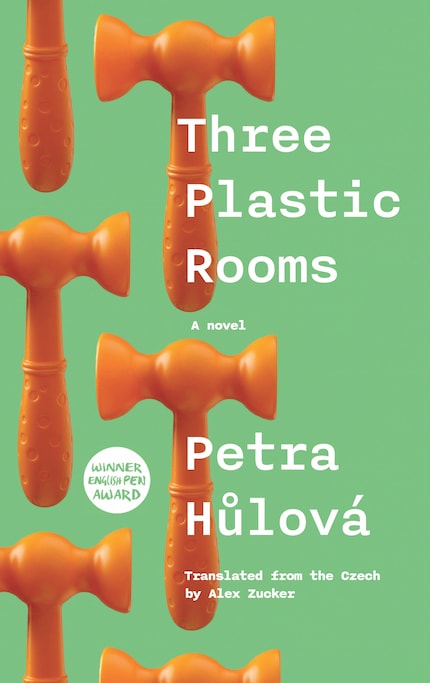Translated from Czech by Alex Zucker (Jantar Publishing, 2017)
Three Plastic Rooms is narrated by an ageing prostitute, and is an extended internal monologue that offers insight into her musings on the world, her life, and her profession. The opening line erupts with contempt (“I wonder if anyone ever gives her a grinding down to the bone?”) and sets the tone for around 160 pages of raw narrative vitriol. No-one is spared from this rage: other sex workers are judged, clients are held in contempt (especially the officers of the law who visit her by day to check nothing illicit is going on and by night to indulge in the services she offers), women are to be pitied for the domestic servitude that is their lot and criticised for accepting it as their only option (for, after all, “counting bills offers a woman more than enough self-gratification”), and above all our narrator is scathing about a society that pushes people – especially women – into a limited range of time-worn possibilities. The narrator herself defies expectation and stereotype: she offers a service, but notes that her clients come to her for “a bit of humanity”, and acknowledges life’s hardships but refuses to surrender to self-pity (“Let others be unhappy, if those are the stories they want to write”).

The translation is clearly a major feat: there are linguistic leitmotivs that Zucker retains in the translation – for example in the prefix “e-”, which is used where sometimes “digital” would be a more obvious collocation, but where switching to “digital” would dilute the repetition (and, to be clear, “digital” wouldn’t work in all cases), but my favourite feature was the hilariously deadpan concatenation of nouns and phrases to describe different sexual references. Here Zucker revels in the range of linguistic possibility: “bangstick” was one of my favourite offerings for penis; there is no ejaculation when a jizzing or a creaming could occur instead; as for sex toys, well, I’ll hand over to Zucker’s translation to show you his full use of outrageously colourful synonyms: “No dildo, no vibrator. No self-erecting quiverstick, manless wang, pond paddle, sleepytime tingletron, ticklepink for beddy-bye”, and the character of our irascible narrator comes out not only in the tirades that are as tireless as her paid performances, but also in the linguistic idiosyncrasies of single words (“if there is a hell, then fwoop, down they all go”).
This all seems gloriously effortless, but the translator’s note at the end is particularly interesting, as Zucker notes how Hůlová plays with language and uses it in innovative and unexpected ways. To read his translation, it is not evident that there was so much agonising behind it – which is a sign that it’s been done well. Even the occasional thing that struck me as a little odd – such as the gendering of genitals in English, to reflect the use of grammatical gender in Czech – is explained convincingly in the translator’s note, so that even if it might not be quite what you might expect, it becomes clear what the text would lose if this aspect were omitted from the translation. So the “hammers” are feminine (which sheds a whole new light on the cover illustration!) and the “sticker-inners” are masculine.
Morality is similarly inverted and subverted throughout the narrative, most memorably in the way the narrator describes the services she offers to clients attracted to minors. By satisfying their desires in the conveniently wipe-clean environment of her three plastic rooms, she postulates, she is saving an anonymous real-life 14-year-old from being subjected to the urges of the men in question (“what says martyrdom more than the love of a mature woman, saving fuckable babies by luring the enemy to her?”). It is, however, not until the final paragraph that we finally see the context for the vitriolic torrent that constitutes the narrative – and it’s a twist that took me by surprise. Once it hit me, I looked at everything in a different light – and that was the great triumph of the story. Three Plastic Rooms is unrelenting in both language and content, but beneath the sex scenes as foul as the language used to describe them it throbs with a rawness and a black humour that render this unlikely anti-heroine an addictive narrator.
Review copy of Three Plastic Rooms provided by Jantar Publishing